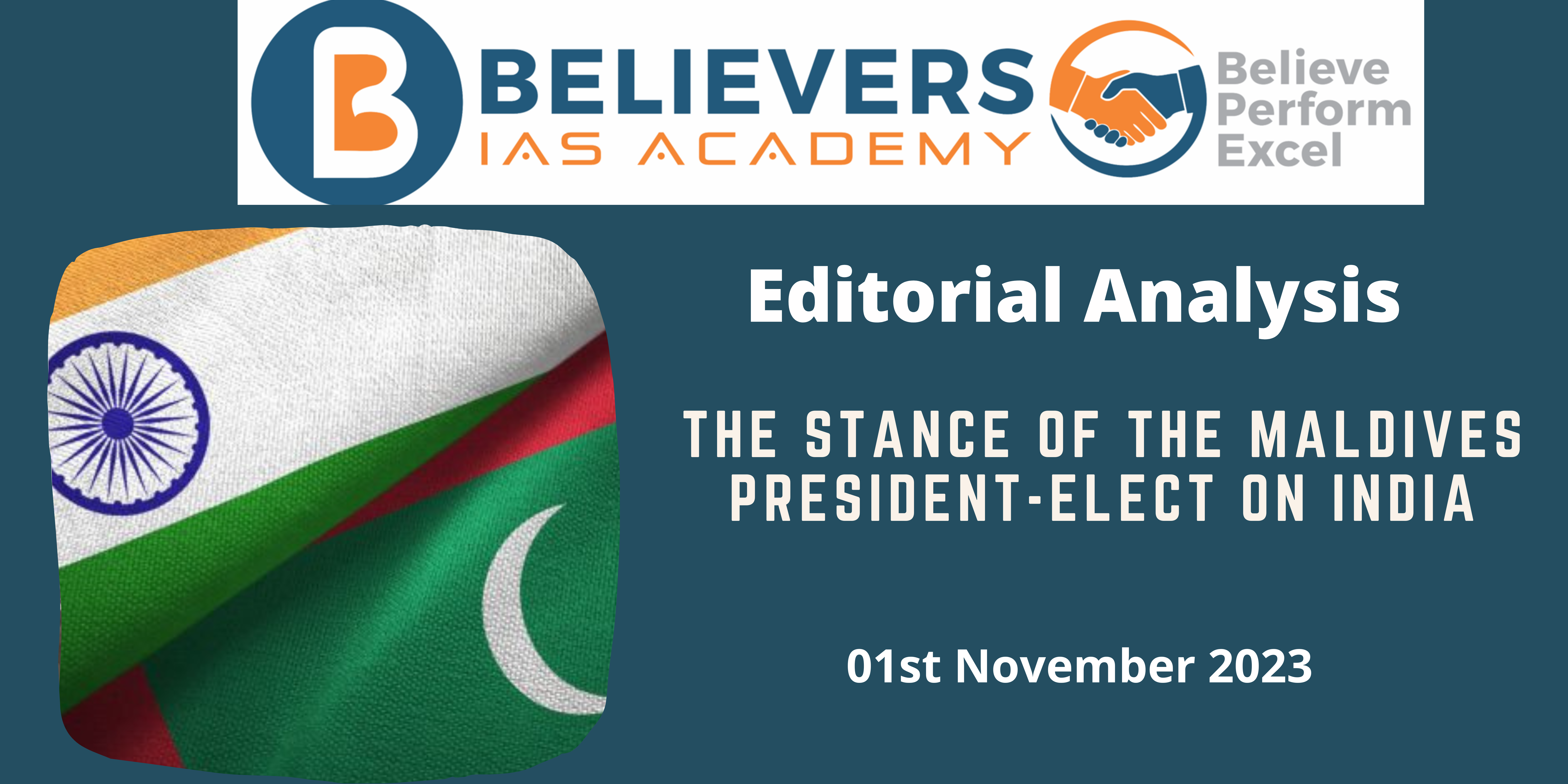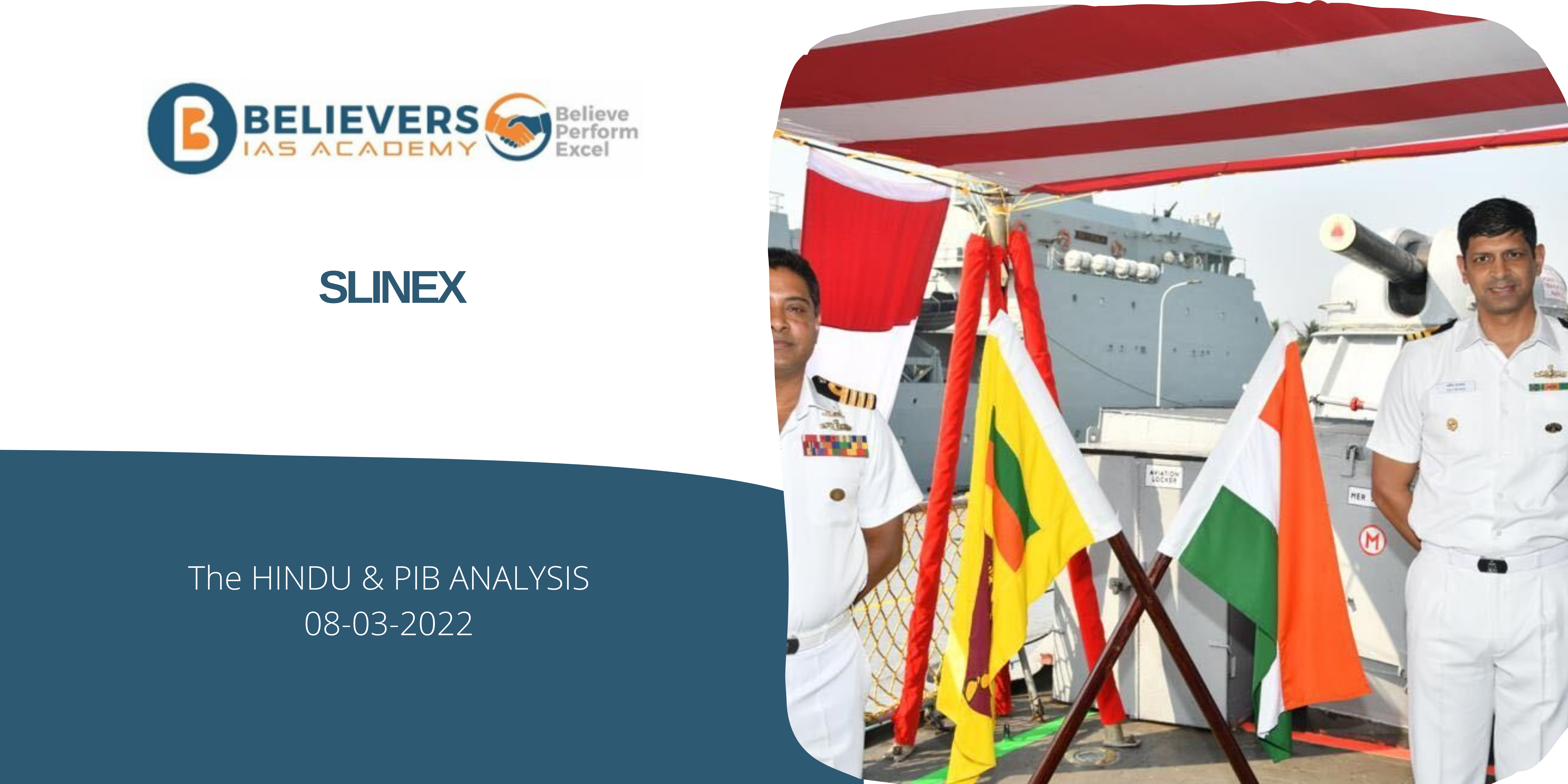The stance of the Maldives President-elect on India
Context:
Following the victory of President-elect Mohamed Muizzu in the Maldivian presidential election, he has emphasised his desire to send Indian troops out of the country.
Relevance:
GS – 02 (Bilateral Groupings & Agreements, Regional Groupings, Indian Diaspora)
Prelims:
Maldives, Belt and Road Initiative (BRI), Indian-Ocean, China, Greater Male Connectivity Project.
Mains Question:
Discuss the implications of the Maldivian President-elect Mohamed Muizzu’s intentions to remove Indian military presence from the Maldives and its impact on the geopolitical landscape in the Indian Ocean region.
Dimensions of the Article:
- Muizzu’s Opposition to Indian Military Presence
- Economic Challenges and Debt Crisis
- India’s Interests in the Maldives
- The implications for India
Muizzu’s Opposition to Indian Military Presence:
- President-elect Muizzu’s stance against Indian military presence aligns with his political camp’s sensitivity towards relations with India.
- The historical backdrop of strained Maldives-India relations during President Yameen’s tenure, marked by a pro-China inclination, influences Muizzu’s approach.
- He emphasizes being ‘pro-Maldives’ while remaining silent on the advantages of Chinese assistance, raising concerns about the Maldives’ debt obligations to China.
- His repeated commitment to removing Indian military presence serves both international media’s focus on geopolitical rivalries and his pre-election promise to supporters. However, concrete foreign policy actions will only unfold after assuming office.
Economic Challenges and Debt Crisis:
- While the focus remains on Indian military presence, Muizzu faces significant economic challenges. The Maldives encounters a substantial debt burden, with upcoming hefty payments in external debt servicing.
- With debts amounting to $570 million annually in 2024 and 2025, escalating to a record $1.07 billion in 2026, mitigating the impending debt crisis becomes a crucial task for Muizzu’s government. The cooperation of major lenders and development partners, India and China, is essential to navigate this economic challenge.
India’s Interests in the Maldives:
- India has established itself as a primary security and economic partner for the Maldives in recent years. Committing $1.4 billion for the socio-economic development of the Maldives, India views its security interests intricately linked with the island nation. Concerns over increasing Chinese influence in the region prompt India’s strategic engagement with the Maldives.
- The country’s participation in the ‘Colombo Security Conclave’, emphasizing collective security in the region, highlights the significant role the Maldives plays in India’s regional security strategies.
The implications for India:
- India has strategically positioned itself as a primary partner for the Maldives, aiming to counterbalance the growing influence of China in the Indian Ocean region. The removal of Indian military personnel signifies a shift in the Maldives’ foreign policy that could alter the regional power dynamics.
- The removal of troops might challenge India’s ability to monitor and safeguard its interests in the Indian Ocean, leading to concerns about security vulnerabilities.
- India has been a significant economic contributor to the Maldives, any changes in the bilateral relationship, especially during Maldives’ looming debt crisis, could disrupt the economic stability of the region. India’s financial aid and support could be affected by a shift in the geopolitical alignment of the Maldives.
- India has actively sought to balance its relations in the Indian Ocean region to counterbalance the growing influence of China. The potential change in the Maldives’ stance could require a reevaluation of India’s diplomatic and strategic approaches in the region, necessitating new alignments to maintain regional stability.
Way Forward and Conclusion:
- President-elect Muizzu’s intentions to remove Indian military presence set the stage for a new foreign policy direction in the Maldives. While the focus remains on the geopolitical implications of this decision, the pressing economic challenges, particularly the looming debt crisis, demand equal attention.
- Striking a balance between strategic foreign policy shifts and economic stability will be crucial for the Muizzu administration. Additionally, the involvement and cooperation of major partners like India and China are imperative for the Maldives to navigate its economic predicament and safeguard its sovereignty in the evolving geopolitical landscape of the Indian Ocean region.
- This shift in the Maldives’ foreign policy may also redefine the regional power dynamics, posing implications not only for India but also for the broader geopolitical balance in the Indian Ocean. As the new government takes charge, the course of actions and policies adopted by President Muizzu will be closely watched, both domestically and internationally, to gauge their impact on regional geopolitics and economic stability.
- The dynamic and interwoven nature of political, economic, and strategic interests in the Maldives highlights the balance necessary for President-elect Muizzu to navigate the challenges ahead, as he charts a new course for the Maldives on the global stage.




